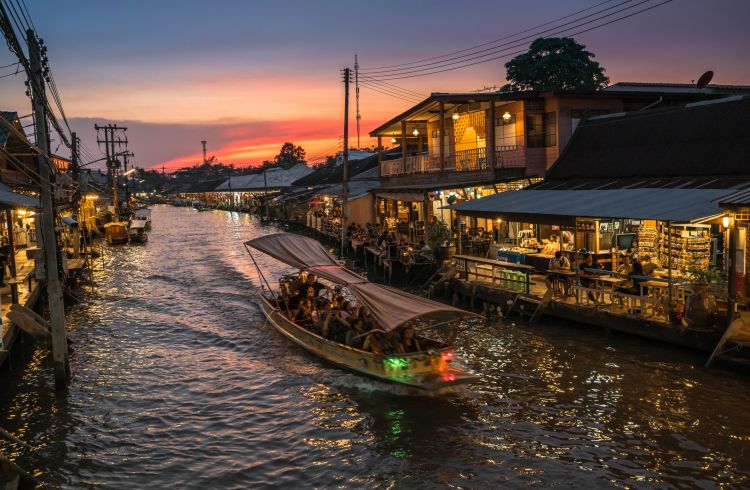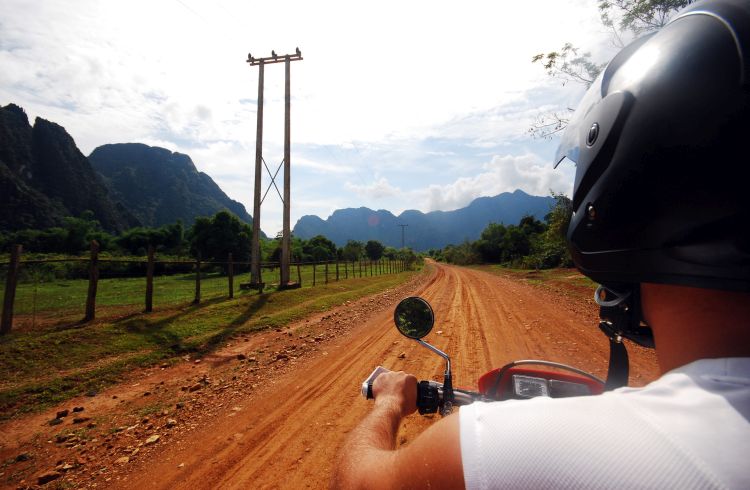Transport in Laos: Tips for Traveling Around Safely
Laos is islands, green landscapes and the mighty Mekong River. But how do you see it all? World Nomads contributor Patrick Leone shares his tips on local transport and how to get around safely.
 Photo © GettyImages/watcharit praihirun
Photo © GettyImages/watcharit praihirun
Laos is home to wondrous natural landscapes, delicious food, and the mighty Mekong River. From the cool mountains of the north to the busy capital city of Vientiane and the sleepy beachside hammocks of 1,000 Islands, there is something incredible to be found every step of the way.
- Border Scams
- Air Travel
- Boat Travel
- Bus Travel
- Other Transport Options
- Drink Driving
- Personal Safety While Traveling
Border scams
Laos is a beautiful country and is easy to get into. Visas are issued on arrival and the process is very straightforward, taking only a few minutes. There
You may get asked to do a health check, which is another way to fleece you of some of your holiday dollars. These were originally in place to prevent the spread of the avian flu epidemic in Asia, which has long past.
There are many tours that will facilitate crossing into Laos. These can be expensive and don't provide much more information than what can be found online. After you cross the border, people will try to sell you tours to Luang Prabang; these are expensive and largely unnecessary. Avoid changing money at the border as rates aren't great.
Is air travel safe in Laos?
After a series of incidents between 1990 and 2003, Laos' national airline underwent an overhaul. The company has a new name, new aircraft, improved airfields and a new attitude to safety and service. Lao Aviation is now Lao Airlines and, after upgrading its fleet, is one of the safest airlines in the region.
All of the major routes use either French-made ATR72-200, ATR72-500 or ATR72-600 aircraft which comply with international aviation safety standards. They also operate Airbus A320 on international routes including codeshares with other airlines such as Thai Airways and Vietnam Airlines. The average age of the fleet is seven years.
Boat travel
The Mekong River runs through the length of this landlocked country and is very much a big part of life. A very popular way to visit Laos is by slow boat from Thailand. This two-day adventure is many people's introduction to life on the water and a departure from Thailand's relative comforts.
Slow boats are a popular way to get around Laos and are often the only possibility to get to more remote villages. They can vary tremendously in terms of quality and seaworthiness. Laos doesn't enforce safety regulations in a way most Western countries do. If another person or bag can physically fit, they will jam it onto the boat. Boats frequently break down and occasionally sink. If you feel that the boat is overcrowded, don’t hesitate to ask to get off. Avoid traveling at night.
These boats rarely have life jackets and very minimal comforts. Many have a simple board as a seat. Cushions can be purchased at the night markets and are necessary for any ride over an hour or for those looking to avoid a sore bottom.
Private boats can be arranged but are more expensive. If traveling with a large group, this could be a better option as the price is for the boat, regardless of the number of passengers.
Speedboats are available but are extremely dangerous. While riding a slow boat one can see these tiny boats fly past. The driver almost always is wearing a motorcycle-grade helmet. They have next to no safety features and crash often. We recommend you avoid them.
Bus travel
For those looking to remain on solid ground, Laos' highways between cities are in very good shape. Travelers can take tour buses or minibusses to all of Laos' major cities in relative comfort. There are sleeper buses available but check reviews. Some buses have one bed for two passengers. If you are traveling alone you will be matched with someone of the same sex but the beds are small and snuggling may be unavoidable. The roads in Laos can vary dramatically and some roads are more dangerous than others, especially at night.
Minibusses live up to their names and have far less legroom than their larger counterparts. Larger buses often drop passengers off at far-flung bus stations requiring a songtao ride to the city center. Minibusses typically drop passengers at their guesthouses or hotels. Tickets can easily be purchased through hotels and guesthouses or from the many travel companies that line the main streets of any city. Quality varies tremendously and names can be misleading, “VIP” buses don’t always indicate great service.
Other transport options
Motorbikes
Once off the main highways, the road conditions deteriorate significantly. Locals weave around potholes on their motorbikes with speed and ease. Tourists can rent motorbikes but a license is required. Police will fine anyone riding without a license. Helmets are not required in Laos, however, your travel insurance will require you to wear one.
Songtaos
Hire car
Private car service is available but is very expensive and often not much faster than minibusses.
Drink driving
Drink driving is a huge problem in Laos and contributes significantly to road fatalities. In the first four months of 2018, over 400 people died on Laos’ roads with most accidents attributed to
If a driver seems like he has been drinking, move on. Even in small towns, there are plenty of options. If driving yourself, be aware of those around you and always ride defensively. It’s best to avoid riding or driving at night.
Personal safety while traveling
Luggage is generally safe when traveling in Laos. Whether by boat or bus, large bags are stowed away for the duration of the trip. Keeping high-value items on your person is always best, but locks on bags that contain valuables are handy when that's not possible. Never leave your bags unattended, especially in busy locations.
Related articles
Simple and flexible travel insurance
You can buy at home or while traveling, and claim online from anywhere in the world. With 150+ adventure activities covered and 24/7 emergency assistance.
Get a quote

No Comments